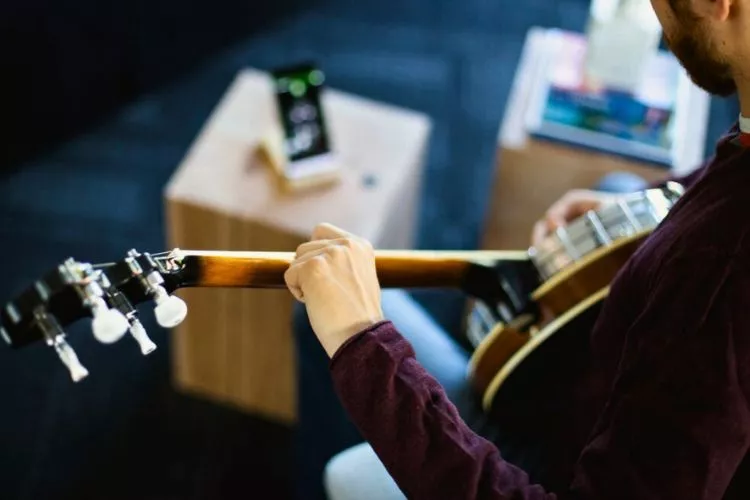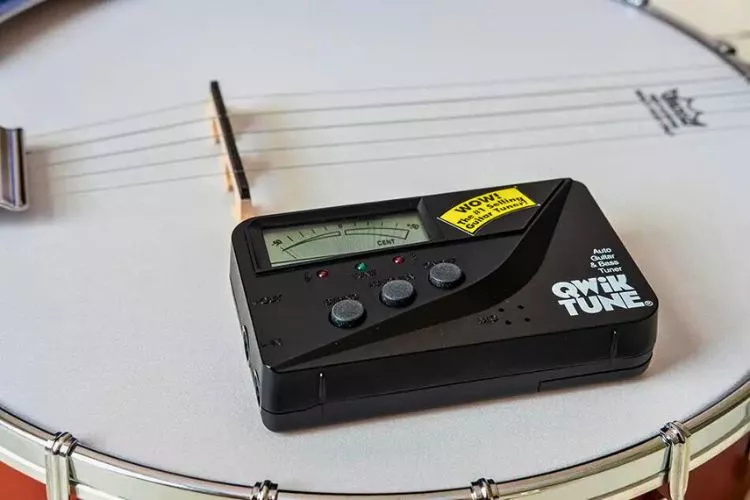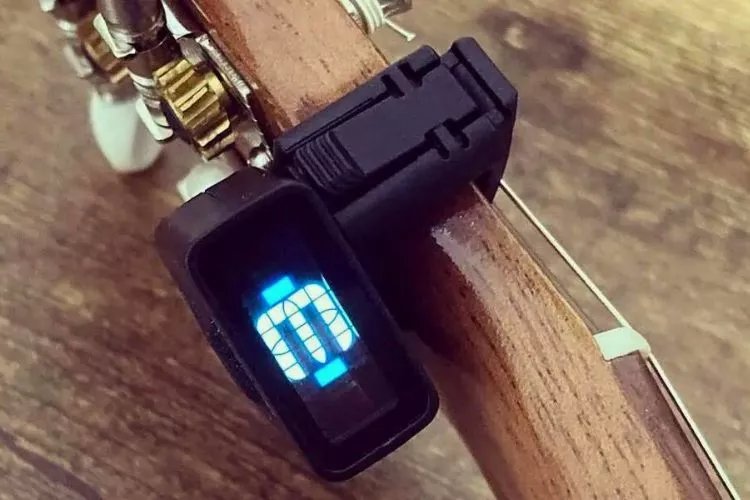Navigating the art of tuning a banjo can be quite a journey for newcomers and seasoned players.
An intriguing question often arises, “can you tune a banjo with a guitar tuner?”
This comprehensive article aims to shed light on this debatable topic, providing an in-depth exploration into the world of tuners and their versatility.

Contents
🎶Can you tune a banjo with a guitar tuner?
Yes, you can tune a banjo with a guitar tuner. Since both banjos and guitars use the same musical notes (A, B, C, D, E, F, G), a guitar tuner can correctly identify the pitch of a banjo string.
Many guitar tuners are chromatic, meaning they can detect all notes, not just those used in standard guitar tuning.
Therefore, whether you’re tuning a 4-string, 5-string, or 6-string banjo, a guitar tuner can effectively help calibrate each string to the correct pitch.
However, it’s important to know the specific tuning you want for your banjo, as this instrument offers several possibilities, like the ‘Open G’ or ‘Double C’ tuning patterns.
As long as you know your desired tuning, a guitar tuner can be valuable for your banjo tuning needs.
🎶How To Use a Guitar Tuner To Tune A Banjo?
Tuning a banjo with a guitar tuner is challenging but also intriguing. This guide enlightens you on the steps to achieving that perfect pitch using a guitar tuner, whether a 4-string, 5-string, or 6-string banjo.

- Know the Tuning Of Your Banjo: Different types of banjos are tuned differently. You need to familiarize yourself with this variability before you start tuning. For instance, a 5-string bluegrass banjo normally uses the Open G tuning (G-D-G-B-D).
- Setup the Guitar Tuner: On your guitar tuner, enable the chromatic mode if available. Chromatic tuners recognize every note, enabling you to tune any instrument, not just those that adhere to standard guitar tuning.
- Begin Tuning: Clip or position the tuner onto your banjo. Start by plucking the first string slowly and let the tuner pick up the sound. If your tuner shows a note different from what you intend, adjust the string’s knob. Turn the knob clockwise for a higher pitch and anti-clockwise for a lower pitch.
- Verify The Tuning: Repeat the process for each string based on the intended tuning. Don’t rush; take your time to ensure each string hits the correct note when strummed.
- Fine-Tuning: Go through each string once again. Since adjusting one could slightly detune another, multiple iterations might be necessary.
A guitar tuner, especially a chromatic one, can be a valuable accessory in your banjo tuning procedure.
Always remember practice and patience are crucial to get that pitch to perfection.
🎶How to Tune a Banjo with an Electronic Tuner?
Electronic tuners provide a simple, accurate, and user-friendly approach to tuning your banjo.
Follow the steps below to tune your banjo with an electronic tuner, whether you have a 4-string, 5-string, or 6-string banjo.

- Familiarize Yourself with Banjo Tuning: Understand the specific tuning required for your banjo. The ‘Open G’ tuning (G-D-G-B-D) is standard for 5-string bluegrass banjos, but other possibilities like the ‘Double C’ tuning exist.
- Prepare the Electronic Tuner: Turn on your electronic tuner and, if available, enable the chromatic setting to detect all notes. Position the clip-on tuner on your banjo’s headstock or peghead to accurately read the pitch.
- Tune Each String: Starting with the highest-pitched string (the one closest to the ground), pluck the string and observe the display on the tuner. It will indicate the note and whether it’s sharp or flat. Adjust the tuning peg accordingly:
- If the note is flat (too low), turn the tuning peg clockwise to tighten the string.
- If the note is sharp (too high), turn the tuning peg counterclockwise to loosen the string.
- Repeat for All Strings: Follow the same process for each string, ensuring they are all correctly tuned to the desired notes.
- Double-Check and Fine-Tune: After tuning all strings, double-check their tuning starting from the first string. Slight adjustments made to one string may impact the tuning of the others, so fine-tuning may be necessary.
Using an electronic tuner is a reliable and efficient method for tuning your banjo. You’ll achieve a perfectly tuned instrument with practice and patience, making for an impressive performance.
🎶Frequently Asked Questions (FAQs)
Yes, a 6-string banjo is typically tuned like a guitar. Each string matches the standard guitar tuning, E-A-D-G-B-E, from the lowest to the highest. This makes the instrument an excellent choice for guitarists who wish to achieve the banjo’s distinct sound without learning a new tuning system.
The chords have the same notes, as both instruments use the same musical scale. However, the fingerings for these chords are not the same due to the different tuning systems and number of strings. A chord will not be formed the same way on a banjo as on a guitar. A 6-string banjo, however, would form chords similar to a guitar due to its identical tuning.
Generally speaking, banjos and guitars are not tuned the same. A common 5-string banjo tuning is the ‘Open G’ (G-D-G-B-D), while a standard guitar is tuned to E-A-D-G-B-E. An exception is a 6-string banjo, often known as a banjitar, which is tuned exactly like a guitar due to its similar string arrangement.
No, you don’t need a special tuner for a banjo. Many guitar tuners are chromatic, which means they can tune any notes, not just those used in standard guitar tuning. These tuners can be used effectively with banjos. However, knowing your specific banjo tuning (like ‘Open G,’ ‘Double C,’ etc.) is necessary to tune the instrument correctly.
Additional Tuning Techniques and Tools for Banjo Players
While using a guitar tuner is a convenient and effective method for tuning a banjo, there are other tuning techniques and tools that can be helpful, depending on your playing style and preferences. Here are some additional options to consider:
Tuning by Ear: Developing Your Musical Ear
For many experienced banjo players, tuning by ear is a valuable skill that allows for quick adjustments in live performances or jam sessions. By tuning one string (typically the lowest or the highest) to a reference pitch—such as a tuning fork, pitch pipe, or another instrument—you can then tune the remaining strings by matching the intervals.
- Start with the 5th string: For a 5-string banjo, often used in bluegrass music, the 5th string (the shortest string) is tuned to a specific pitch, usually G.
- Match the 4th string: After tuning the 5th string, you can tune the 4th string (the lowest) to a G note, using the 5th string as a reference.
- Tune the 3rd string: Using the 4th string as a reference, adjust the 3rd string to a D note.
- Tune the 2nd string: Using the 3rd string as a reference, adjust the 2nd string to a B note.
- Tune the 1st string: Finally, tune the 1st string to a D note, using the 2nd string as a reference.
This method helps you develop a strong musical ear and gives you more control over your tuning, especially when no electronic tuner is available.
Using a Clip-On Tuner for Convenience
If you prefer more convenience while tuning your banjo, a clip-on tuner can be a great option. These small devices attach directly to the headstock of your instrument, detecting vibrations from the strings rather than relying on a microphone. This is especially useful in noisy environments or outdoor settings where other tuners may struggle to pick up accurate readings.
Clip-on tuners are also portable, affordable, and generally provide accurate tuning for all types of banjos, whether 4-string, 5-string, or 6-string.
Importance of Regular Tuning Checks
Banjo strings can easily go out of tune, especially when playing outdoors or after a long session. It’s important to perform regular tuning checks, particularly before a performance or recording. Even small variations in pitch can affect the sound quality and overall performance. Regular tuning will help maintain the consistency of your playing and improve your overall sound.
By combining these additional methods with the use of electronic or guitar tuners, you can enhance your ability to keep your banjo in top condition and ready for any musical occasion.
Conclusion:
Finding an effective way to tune your banjo ensures a harmonious performance. In exploring the compatibility of guitar tuners with banjos, it is evident that a banjo can be successfully tuned using a guitar tuner.
Particularly, chromatic guitar tuners offer reliable precision for banjo tuning.
Whether you’re playing a 4-string, 5-string, or unique 6-string banjo, understanding the specific tuning of your instrument paired with a versatile guitar tuner can lead you to achieve the perfect pitch, granting an elevated musical expression.
